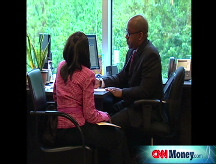Minimum wage hike kicks in
National rate will rise 70 cents Thursday to $6.55 per hour in the second phase of three-stage increase.
NEW YORK (CNNMoney.com) -- The federal government is set to boost the nation's minimum wage Thursday in the second of three increases mandated by Congress.
The national minimum wage will increase by 70 cents to $6.55 per hour as part of the Fair Minimum Wage Act of 2007.
Before last year's legislation, the national minimum wage had been left unchanged at $5.15 an hour since 1997.
The act calls for a third and final increase, scheduled to take place on July 24, 2009, that will raise the minimum wage to $7.25 per hour.
"The increase in the minimum wage comes at an important time for the millions of Americans struggling to make ends meet," Rep. George Miller, D-Calif., a lead sponsor of the bill, said in a statement.
But the government's efforts may not be enough to help struggling workers, according to a report by economists at the labor-backed Economic Policy Institute (EPI).
Even with the increase, the federal minimum wage remains below the rate in 23 states and the District of Columbia, the EPI reported.
The institute believes that, even at the new federal level, a full-time, minimum-wage worker earns below the poverty line for a household of two.
"This reflects a stark reality in America: in the face of the rising cost of living for low-wage workers, the federal government is not guaranteeing a fair wage," said Mary Gable, an EPI economist, in a statement.
Businesses, meanwhile, are concerned that higher labor costs will make an already adverse enconomic environment even more difficult.
"With inflation pressures increasing for small business owners, this is not the best time to be forcing employers to pay workers higher wages," said William C. Dunkelberg, chief economist for the National Federation of Independent Business, in a statement.
With labor costs accounting for 70 -80% of business costs, raising the minimum wage will force producers to pass on the added expense to consumers, Dunkelberg said.
What's more, lifting the minimum wage deters employers from hiring young and unskilled workers, since they become more expensive, according to the NFIB.
"So, the increased minimum wage makes it more difficult to hire those who are most adversely affected by the economic slowdown," Dunkelberg said. ![]()





